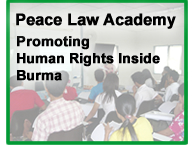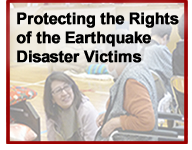1.
New UNGA resolution and delay on achieving
full accountability
On February 26 2010, the UN General Assembly
adopted a resolution requesting
the Secretary-General to report on the progress of investigations
of Israel and the Palestinian side to the General Assembly within a period of
five months.
Almost
1400 people including civilians died during the Gaza Conflict which lasted from
between December 2008 to January 2009. However, accountability for the violations of international
humanitarian and international human rights law has still not been achieved, although more than a year has
passed since the conflict.
In November 2009, the U.N. General Assembly
adopted a resolution calling for both
Israel and the Palestinian side to undertake investigations that are "independent,
credible and in conformity with international standards" within a period of
three months, following
the release of the report of the U.N. Fact-Finding Mission, (also
called the Goldstone Mission, which was mandated by the U.N. Human Rights
Council) which found that both sides of the conflict violated international
humanitarian and human rights law. However, both parties have failed to conduct
the required investigations during the period and a new resolution was adopted
to extend the deadline by five months.
Human Rights Now (HRN) is concerned that the
delay of the investigations goes against the hope of victims, which may lead to
the acceptance of the situation of impunity. Therefore, HRN requests the U.N. General Assembly to take further
action immediately, rather than waiting five months for the results of the investigations.
2. Unsatisfactory results of the
investigations
Prior to the due date, February 5 2010, the
Israeli government, the Palestinian Authority
and Hamas submitted answers to the Secretary General for the UNGA resolution. Neither demonstrated
that they had conducted independent and impartial investigations.
In the investigation report of Israel, which
was published on January 29, 2010, Israel announced that it had investigated
150 cases. However, the entire contents of those investigations have not been
disclosed to the public and transparency in the investigation process has not
been adequately ensured.
Moreover, the investigations have been
conducted in a decidedly one-sided manner, the details of which are as follows:
① No field
investigations in Gaza were conducted,
② No
hearings from victims or witnesses were conducted,
③ Fact-finding was based on
confidential briefings which took place inside
the military, and
④ Investigations were targeted only
at soldiers who were engaged in the military operations, the legality of the
military orders and plans themselves or the accountability of superior officers
in the chain of command was not examined.
Further, the organization which conducted the
investigations was not independent of the military. Therefore, the credibility
and independence of Israel's investigation are doubtful. The investigation also
concluded that the use of weapons containing white phosphorous in a densely populated area is not a
violation of international humanitarian law, which deviates
considerably from the international humanitarian law standards.
With regard to the investigation carried out by
Hamas, the letter
submitted by the Palestinian Authority on
January 29, 2009 to the Secretary General was a notice regarding the
establishment of an independent investigation committee by the Palestinian Authority
but did not detail any substantial content of the investigation. The summary of
the internal investigations submitted by Hamas on February 2, 2010 noted that
the rocket attacks, which the Goldstone report concluded amounted to war
crimes, did not have
the objective of killing of civilians, but only
military targets. No other details were
disclosed.
Given this situation, there is no guarantee
that the mere extension of the deadline will lead to the implementation of
good-faith investigations in conformity with international humanitarian and
international human rights law.
HRN
requests the U.N. Secretary General to seek the opinions and advice of the U.N.
High Commissioner of Human Rights and experts of international humanitarian and
international human rights law on this matter and to monitor and assess the
proceedings of investigations independently of Israel and Palestinian in order
to make recommendations on the independence, impartiality and transparency of the
investigations that Israel and Palestine have carried out.
3. HRN welcomes the votes in favor of the
UNGA resolution by the Government of Japan and other governments, and requests
the international community play further roles.
Since the Gaza conflict, Japan,
which had abstained from voting at the U.N. General Assembly and Human Rights
Council, voted in favor of the UNGA resolution along with other European
countries including the UK and France. HRN considers these votes in favor as
positive progress.
HRN has been working on this matter, especially
with regard to the Japanese government, by holding meetings at the Diet and making requests for the cooperation
of Japanese civil society. HRN welcomes the Japanese government's vote. HRN
further urges the Japanese government to take more initiatives at the U.N.
General Assembly, the Human Rights Council and the Security Council, with
regard to the situation in Palestine, so that international humanitarian and
international human rights law may be respected, and the culture of impunity is
ended in Gaza.
The U.N. Security Council, which has not taken
an active role in this matter, should display more active initiatives in this
new phase. This is because three permanent members (the UK, France and China) have
voted in favor of the UNGA, and also because both parties within the conflict
have failed to implement appropriate investigations.
Given the recommendations of the Goldstone
report to the Security Council last September, HRN requests the U.N. Security
Council to create an opportunity to discuss this matter intensively without
waiting for the due date of the five-month extension and to assess whether the
investigations would be implemented in a credible and independent manner in
conformity with the international humanitarian and international human rights
law. In the absence of good-faith investigations, HRN requests the U.N.
Security Council to consider further measures including the referral to the
International Criminal Court and also requests the Japanese government, a
non-permanent member of the Security Council, to take more initiative in the
future.







